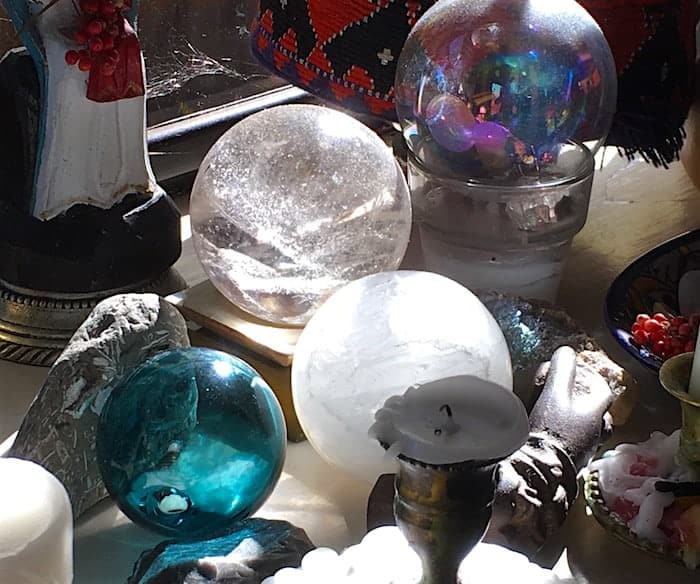In our zeal to clean up, throw away, and streamline we are in danger of losing touch with important moments and aspects of our lives. Before you toss out that old theater program or cluster of dried leaves, step back, take a deep breath, and consider this:
• Clutter preserves our Identity. Strip a room utterly of your familiar toys, tchotchkas, plants, post-its, notepads, and little nameless souvenirs, and you’ve stripped it bare of your unique personality. Clutter places you in the here and now, in the center of your life and your work. Things we keep around us are part of us. Even the scraps of paper, the little handwritten notes and doodles. These can contain special memories that love to be looked at and touched.
• Clutter stimulates creativity! Ideas hide inside of clutter waiting to be released. Keeping pet objects around us is the sign of a playful imagination. Let’s face it — a clutter-free room is a room stripped of creative potential.
• Clutter is fun for the eyes. They crave unusual shapes, colors and textures. Making sure your immediate environment is filled with visual “news” creates exercise for the eyes, and that means the brain too!
• Clutter is like a mini city, filled with cultural richness and stimulation. Or like fine wines, assembled “stuff” suggests subtle and eclectic associations. These in turn lead to labyrinths loaded with potential discoveries, solutions, and just plain delight.
• Clutter suggests alternative ways of doing things. Your eye snags on a bit of napkin from a cafe in San Francisco and you remember the decor and how you can translate that into your own home. A stray business card suddenly suggests a way of laying out your newsletter. Random juxtapositions of paper and pen, tissues and succulents can contain an internal logic waiting to be understood.
• Clutter organizes and articulates space. The things we keep around us serve to punctuate our work space, giveing it multi-dimensional, multi-layered meaning. It makes the space in which we live and work more vivid, more specific. A bare workspace has all the ambience of solitary confinement.
• Clutter kickstarts conversation. Our unique collections of this and that create opportunities for our guests to respond, “Where did that little glass globe come from?” or, “I used to have one of those. Why did I get rid of it?” The objects that make our lives ours can open portals of unexpected pleasure and discovery for everyone around us. Yes, clutter can even be inspiring.



My Mother would have loved this…… She saved everything!
Amen.
Wonderful thoughts! I guess my quest is to have just the right balance between creative clutter and real space to work on my paintings. Memories get buried, then found again when the need to organize comes into play. Thank you for giving me a different perspective on my messy office and studio!
My thinking is changing on this subject, because I used to hold on to “things” in case I might need them some day. And it’s true, because as soon as you get rid of something, you find the perfect use for it.
But now, I’m in another season of my life, and I want to spare my kids the nightmare of having to go thru tons of papers, knic knacs, accessories, etc. I love the cartoon on Facebook that says “I’m trying the Japanese method of getting rid on anything that doesn’t bring me joy, so I threw out all my vegetables, my bra ……
So true- thank you Christina for defending clutter…I might lose my creativity if I did clean out my office- and you are correct those spaces have all the ambience of solitary confinement!
Keeping things that only bring you joy is not being realistic. Life has so many emotions and each one be it sadness or joy, create who we are and yes tells our story. We are made up of many things so why not embrace the things that tell your story. The Pollyanna life is not only unrealistic it’s also sterile as Dr. Christina has mentioned. Keep what means something to you or that triggers a memory of your life, your story, as everyone’s story is important. You just need to organize it all appropriately in your home like you would if it were a collection for a museum. Organizing is the key then the stuff will not feel like clutter:)
DaeP